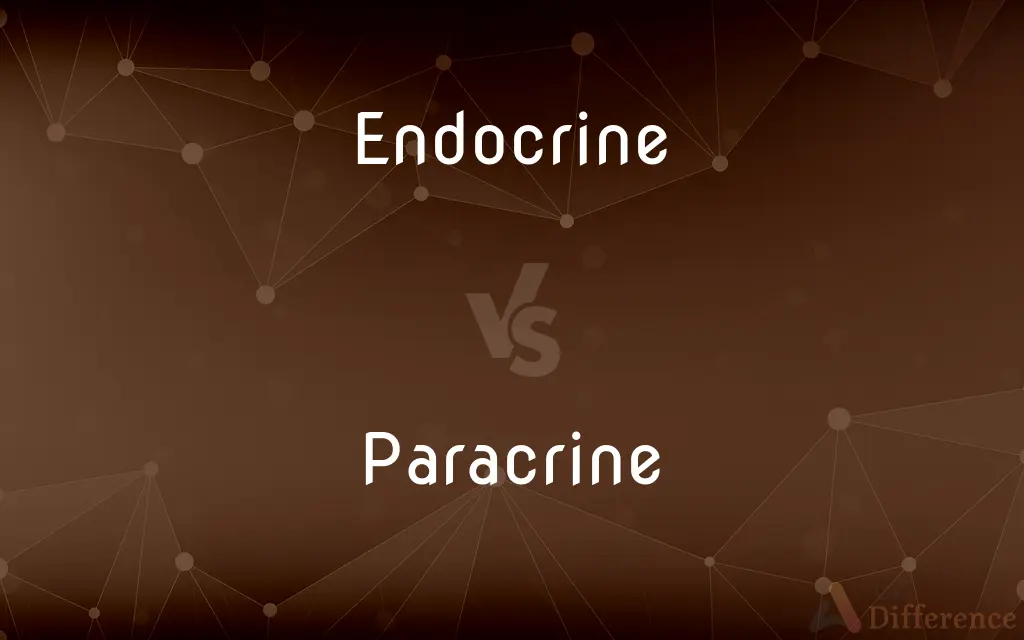Endocrine vs. Paracrine — What's the Difference?
Edited by Tayyaba Rehman — By Fiza Rafique — Updated on September 30, 2023
Endocrine refers to hormone secretion into the bloodstream affecting distant cells, while Paracrine involves hormones affecting neighboring cells.

Difference Between Endocrine and Paracrine
Table of Contents
ADVERTISEMENT
Key Differences
The Endocrine system operates through glands that release hormones directly into the bloodstream, targeting distant cells or organs. Paracrine signaling, conversely, represents a form of cell-to-cell communication where cells produce signals that affect nearby, neighboring cells.
Endocrine actions often have systemic effects, given that the hormones can travel throughout the body via the circulatory system. Paracrine actions are localized because the signaling molecules usually act on adjacent cells and don't travel far from their source.
A hallmark of Endocrine signaling is its ability to enact changes that can last longer and be more widespread. The effects of Paracrine signaling tend to be shorter-lived, primarily because the molecules degrade rapidly or are reabsorbed by the originating or nearby cells.
Examples of Endocrine glands include the thyroid, adrenal, and pituitary glands. On the other hand, Paracrine actions are exemplified by the release of certain growth factors and cytokines that act on neighboring cells.
It's essential to understand both Endocrine and Paracrine systems for a comprehensive grasp of physiological communication. While the Endocrine system orchestrates broad and sustained responses, the Paracrine system facilitates rapid and localized cell communication.
ADVERTISEMENT
Comparison Chart
Nature of Signaling
Hormonal signaling to distant cells.
Hormonal signaling to adjacent cells.
Distance Covered
Can travel throughout the body.
Limited to neighboring cells.
Duration of Effect
Often longer-lasting effects.
Typically short-lived effects.
Examples
Thyroid, adrenal, pituitary glands.
Growth factors, cytokines affecting neighboring cells.
Scope of Influence
Systemic influence due to circulatory distribution.
Localized influence within tissue.
Compare with Definitions
Endocrine
Pertaining to hormones secreted into the bloodstream.
The thyroid is an important Endocrine gland regulating metabolism.
Paracrine
Pertaining to effects on nearby target cells.
The release of growth factors exhibits Paracrine action.
Endocrine
Concerning the system of internal secretion.
The Endocrine system works in tandem with the nervous system for homeostasis.
Paracrine
Relating to signals targeting neighboring cells.
Paracrine factors in the skin aid in tissue repair.
Endocrine
Descriptive of systemic hormonal action.
Endocrine feedback loops help maintain equilibrium.
Paracrine
Referring to local intercellular communication.
Inflammation often involves Paracrine release of cytokines.
Endocrine
Relating to glands that release hormones systemically.
Endocrine disorders can affect multiple bodily functions.
Paracrine
Concerning localized cell-to-cell communication.
Paracrine signaling plays a role in embryonic development.
Endocrine
Referring to distant cellular effects via hormones.
Endocrine responses to stress involve the release of cortisol.
Paracrine
Describing short-range hormonal influence.
Paracrine mechanisms often counterbalance endocrine actions.
Endocrine
Secreting internally.
Paracrine
Of or relating to the release of locally acting substances from endocrine cells.
Endocrine
Of or relating to endocrine glands or the hormones secreted by them.
Paracrine
Describing a hormone or other secretion released from endocrine cells into the surrounding tissue rather than into the bloodstream
Endocrine
The secretion of an endocrine gland; a hormone.
Endocrine
An endocrine gland.
Endocrine
Producing internal secretions that are transported around the body by the bloodstream.
Endocrine
Pertaining to the endocrine glands or their secretions.
Endocrine
The secretion of an endocrine gland.
Endocrine
An endocrine gland.
Endocrine
The secretion of an endocrine gland that is transmitted by the blood to the tissue on which it has a specific effect
Endocrine
Any of the glands of the endocrine system that secrete hormones directly into the bloodstream
Endocrine
Of or belonging to endocrine glands or their secretions;
Endocrine system
Common Curiosities
Can Endocrine hormones affect any cell in the body?
Endocrine hormones can potentially reach any cell, but they only affect cells with the appropriate receptors.
What does Endocrine mean?
Endocrine refers to the secretion of hormones directly into the bloodstream to affect distant cells.
How does Paracrine differ?
Paracrine signaling involves hormones or signaling molecules affecting adjacent or neighboring cells.
Is the pituitary gland an example of Endocrine signaling?
Yes, the pituitary gland secretes hormones into the bloodstream, exemplifying Endocrine signaling.
What's an example of a Paracrine signal?
One example is the release of growth factors that act on nearby cells.
Which has a broader scope, Endocrine or Paracrine?
Endocrine signaling has a broader scope due to its systemic nature, whereas Paracrine is localized.
Why is the Endocrine system vital?
The Endocrine system is essential for regulating growth, metabolism, mood, and many other functions.
Where is Paracrine signaling commonly seen?
Paracrine signaling is often observed in tissue repair, embryonic development, and inflammation.
How do cells receive Endocrine signals?
Cells receive Endocrine signals via receptors specific to the hormone being released.
Does Paracrine signaling involve the bloodstream?
No, Paracrine signaling is localized, so it doesn't typically involve the bloodstream.
Are Paracrine signals long-lasting?
No, Paracrine signals are typically short-lived and localized.
Are there overlaps between Endocrine and Paracrine actions?
While distinct, some molecules can function in both Endocrine and Paracrine capacities under different conditions.
What's an example of an Endocrine disorder?
Hypothyroidism, where the thyroid doesn't produce enough hormones, is an Endocrine disorder.
How do Paracrine signals know where to act?
Paracrine signals act on nearby cells, so their range is limited, often by rapid degradation or reuptake.
Can one cell type have both Endocrine and Paracrine functions?
Yes, depending on the situation and the signaling molecules involved.
Share Your Discovery

Previous Comparison
Mat vs. Matt
Next Comparison
Evolution vs. EvolveAuthor Spotlight
Written by
Fiza RafiqueFiza Rafique is a skilled content writer at AskDifference.com, where she meticulously refines and enhances written pieces. Drawing from her vast editorial expertise, Fiza ensures clarity, accuracy, and precision in every article. Passionate about language, she continually seeks to elevate the quality of content for readers worldwide.
Edited by
Tayyaba RehmanTayyaba Rehman is a distinguished writer, currently serving as a primary contributor to askdifference.com. As a researcher in semantics and etymology, Tayyaba's passion for the complexity of languages and their distinctions has found a perfect home on the platform. Tayyaba delves into the intricacies of language, distinguishing between commonly confused words and phrases, thereby providing clarity for readers worldwide.














































